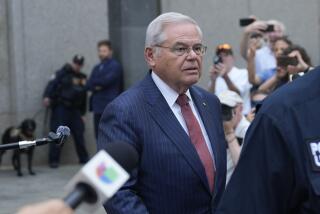Jay Rockefeller, a West Virginia Democrat, to retire from Senate
WASHINGTON -- Facing the prospect of a tough reelection fight, veteran West Virginia Sen. Jay Rockefeller, 75, announced Friday that he will leave the Senate when his current term ends.
His decision makes him the first senator in either party whose term expires after next year to make a retirement announcement.
Rockefeller said at a ceremony in Charleston, the state capital, that after nearly “50 years of public service in West Virginia, I’ve decided that 2014 will be the right moment for me to find new ways to fight for the causes I believe in and to spend more time with my incredible family.”
Tall and soft-spoken, the moderate Rockefeller would have faced a highly competitive reelection contest had he decided to seek a sixth six-year term. Though historically Democratic, West Virginia has been trending Republican, at least at the presidential election level, in recent years.
Rep. Shelley Moore Capito, a popular Republican and member of a state political dynasty, is the early favorite to win the seat. Not long after last fall’s election, she indicated that she intended to run. But she could face Republican primary opposition. Democrats mentioned as potential candidates include Jim Justice, wealthy owner of the Greenbrier resort, although there could be a sizable field of Democratic contenders.
In interviews prior to formally announcing his retirement, Rockefeller had said he thought he could win reelection. He maintained that Capito’s intention to challenge him did not influence his decision to retire.
Democrats hold a 55-45 seat advantage in the Senate. If Massachusetts Sen. John Kerry is confirmed as secretary of State, a special election will be held to fill his seat through the 2014 election. Former Republican Sen. Scott Brown, who won a Senate seat in a special election after the death of Sen. Edward M. Kennedy but lost it to Democrat Elizabeth Warren last fall, is among the potential candidates.
Based on the current lineup, Democrats will be defending 22 seats in next year’s election. At least 10 of those contests are likely to be highly competitive. Republicans will be defending only 14 seats and, barring retirements or surprises, none of the GOP seats appears to be at risk.
Born in New York City and educated at Harvard, John D. Rockefeller IV, great-grandson of the oilman who founded the family fortune, went to work as a VISTA volunteer in poverty-stricken, rural West Virginia in the 1960s. He began his political career there in 1966, winning election to the state Legislature, and eventually seeking the governorship in 1972 (he lost to Arch Moore, father of Shelley Moore Capito).
Four years later, Rockefeller won the first of two terms as governor. In his successful 1980 reelection, he again faced Arch Moore. Referring to Rockefeller’s funding of his campaign with his own money, Moore’s supporters plastered the state with bumper stickers that read, “Make Him Spend It All, Arch.”
He was elected to the Senate in 1984 and earned a reputation as a progressive on issues such as healthcare. He has also been an active member of the Intelligence committee. He was often mentioned as a potential national candidate for president or vice president. In 1991, he considered a run for president in the 1992 campaign but, after testing the waters, decided not to enter the contest.
Among the family members joining him for the announcement in Charleston was his wife Sharon Percy Rockefeller, a former board chairman of the Corporation for Public Broadcasting and daughter of former Republican Sen. Charles H. Percy of Illinois, who died in 2011.
Twitter: @paulwestdc
More to Read
Get the L.A. Times Politics newsletter
Deeply reported insights into legislation, politics and policy from Sacramento, Washington and beyond. In your inbox three times per week.
You may occasionally receive promotional content from the Los Angeles Times.










